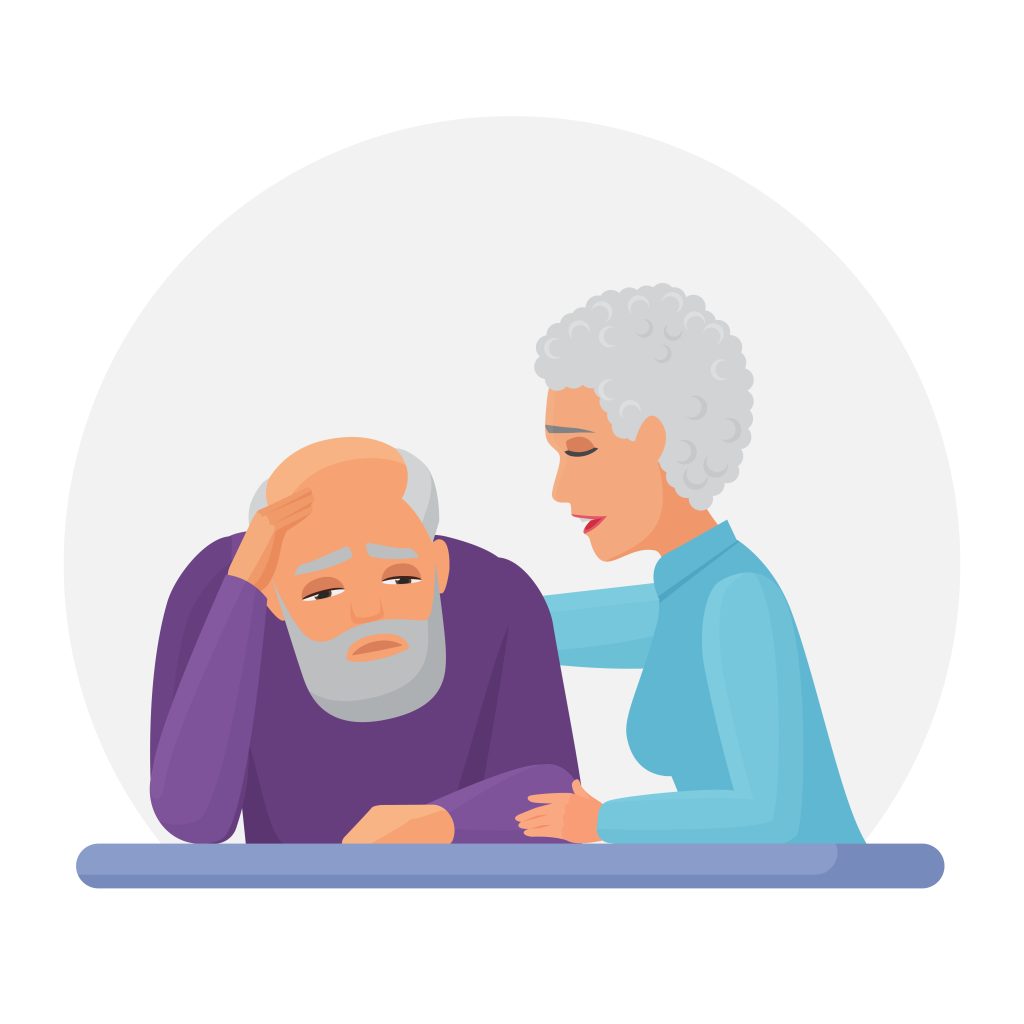Depression is a common problem among seniors, with many potential causes. It can be caused by physical health problems, personal losses, social isolation, or financial stress. Treating depression requires understanding its cause and finding the right solution for each individual. With proper care, seniors can overcome depression and enjoy their lives.

Symptoms of depression
Depression is a serious mental health illness that can manifest itself in many ways. While one’s individual experience of depression is unique and multifaceted, the common indicators of a depressive episode are often notable changes in sleeping patterns, diet, energy levels, and interests. Each person’s symptoms may be affected by different factors, such as biological dispositions, environmental pressures, and traumatic incidents, but everyone has their way of coping with their depression. It is important to be aware of these symptoms so that early interventions can be drawn up to provide individuals with help and support as soon as possible.
Main causes of depression
While not always the case, seniors often face many difficulties that can cause depression. From simple loneliness due to retirement to the anguish of a loved one passing away, seniors must be aware of the threats of depression. In addition, seniors are unfortunately susceptible to chronic health issues and even dementia, increasing their risk of developing depression. As such, seniors must actively prioritize mental health and exercise coping mechanisms to combat the possible causes of depression.
A major life event
Navigating a major life event such as the death of a spouse, retirement, or moving to a new home can be emotionally and logistically challenging. It is important to know the steps to take and prepare accordingly in order to process the changes successfully. Ultimately, it will require a bit of courage, patience, and perseverance to work through the different stages while being mindful of one’s own well-being. Taking small baby steps and relying on supportive relationships when needed can assist with making this life transition smoother.
Chronic health condition
A chronic health condition or pain that limits mobility or independence can be difficult to manage. There are many resources available to help those who are struggling. Support groups, online forums, and counseling are all great options for finding help. Don’t be afraid to reach out for help if you are struggling.
Isolation from friends and family
Being isolated from one’s social circle due to physical distance or a lack of transportation is an experience that many can relate to. Whether it can be through relocation, military deployment, or financial hardship, isolation from friends and family causes individuals to feel disconnected and alone. However, advances in modern technology have opened up various ways for people to stay connected despite being far away. Video calls, instant messaging, email, and other services make it easier than ever for people in various locations around the world to interact with one another. While physical distance can still be challenging, staying connected electronically can help minimize feelings of loneliness and help remind us that even when apart, our loved ones are only a message away.

Financial insecurity or stress
Fixed incomes, such as annuities or retirement pensions, can often be insufficient to meet the financial needs of individuals. This is compounded by rising costs of essential services, which have grown disproportionally faster than incomes. This can create significant financial insecurity and stress, particularly in cases where individuals must rely exclusively on their fixed income. This insecurity can lead to an inability to meet even basic needs, jeopardizing both short-term and long-term economic security. It highlights the important role that government must play in advocating for those unable to meet their financial obligations through access to societal support and other forms of assistance. However, it is important that individuals also take appropriate measures to protect themselves from financial hardship wherever possible.
Grief over the loss of a loved one
Grief is one of the most intense and perplexing emotions experienced when a loved one dies. Whether it be the loss of a human companion, such as family or dear friends, or an animal companion with their own array of quirks and traits, there is a common thread within this feeling: a deep sense of sorrow and an overwhelming sense of loneliness. Even when faced with tremendous sadness, it is important to remember that this period holds much value; while mourning our lost loves, we reflect on the memories and moments they brought into our lives, cherishing them and being grateful for them time spent together.
Poor nutrition
Poor nutrition is a serious problem that can have real and long-lasting repercussions for one’s health. Poor appetite or difficulty preparing meals due to physical incapability, inadequate resources, or limited knowledge about nutritional requirements can all lead to malnourishment. Eating nutrient-deficient meals compromises the ability of the body to absorb vitamins and minerals, leading to further health problems such as the increased risk of infection, fatigue, a depressed immune system, and a decreased ability to fight off disease. In extreme cases, malnourishment can be fatal. It is important to recognize when someone might need assistance with their dietary needs and act accordingly to ensure they receive proper nutrition.
Depression can lead to serious consequences
Depression is an extremely serious condition that can lead to adverse effects if not addressed promptly. Mental health professionals recommend an integrated treatment approach that includes psychotherapy and medication to manage depressive symptoms. In the most severe cases, depression can lead to extreme thoughts like those of suicide. Reports from the World Health Organization (WHO) cite suicide as the second leading cause of death among 15-29-year-olds globally, making this a significant risk for those struggling with their mental health. Left untreated, it can be a fatal disorder for many people. It is, therefore, critical for all sufferers of depression to reach out for help and develop a plan for managing their condition and its potentially life-threatening consequences.
Last Word
Though we may not be able to prevent all cases of senior citizen depression, raising awareness is the first step. By understanding the common causes of this condition, we can begin to find solutions that will help our elderly loved ones maintain their mental health and live happy, fulfilling lives. Do you have any suggestions for how to address senior citizen depression? Please share them in the comments below.
Frequently Asked Questions
Depression in seniors is unfortunately very common and is often overlooked as a sign of aging. Common signs to look out for include isolation from family and friends, expressing feelings of hopelessness, low energy levels, fluctuations in appetite or weight, difficulty sleeping or oversleeping, memory issues, difficulty focusing on tasks or thinking, a lack of interest in hobbies or activities that you once enjoyed, and changes in the ability to care for oneself. It’s vital to pay attention to these signs and have conversations with your loved ones about their mental health. Early detection can lead to successful treatment for depression and help restore a sense of normalcy.
Depression in seniors is a serious issue that shouldn’t be taken lightly. Risk factors for depression may include social isolation, physical health, and cognitive impairments, medication side effects, depression or mental health history, chronic stressors in life such as financial struggles or the death of a loved one, and even genetics. It’s important to recognize depression in seniors early so specific interventions can be implemented. Be mindful of any changes in attitude and outlook that your elderly relatives may experience so you can act quickly to get them the help they need.
Depression in seniors is a widespread mental health issue, as depression can emerge due to life changes, chronic illness, or other factors related to aging. Fortunately, effective treatments are available for seniors looking to manage depression symptoms. Such treatments may include therapy, such as cognitive-behavioral therapy and psychodynamic therapy. Medication is also recommended for some seniors with depression, such as antidepressants and antipsychotic medications. Additionally, lifestyle changes like healthy eating habits and regular exercise have been shown to have positive outcomes. Finally, social support from friends and family can be important in addressing depression in seniors. With these treatment options at their disposal, seniors can begin on a path toward managing depression and improving overall mental health.




